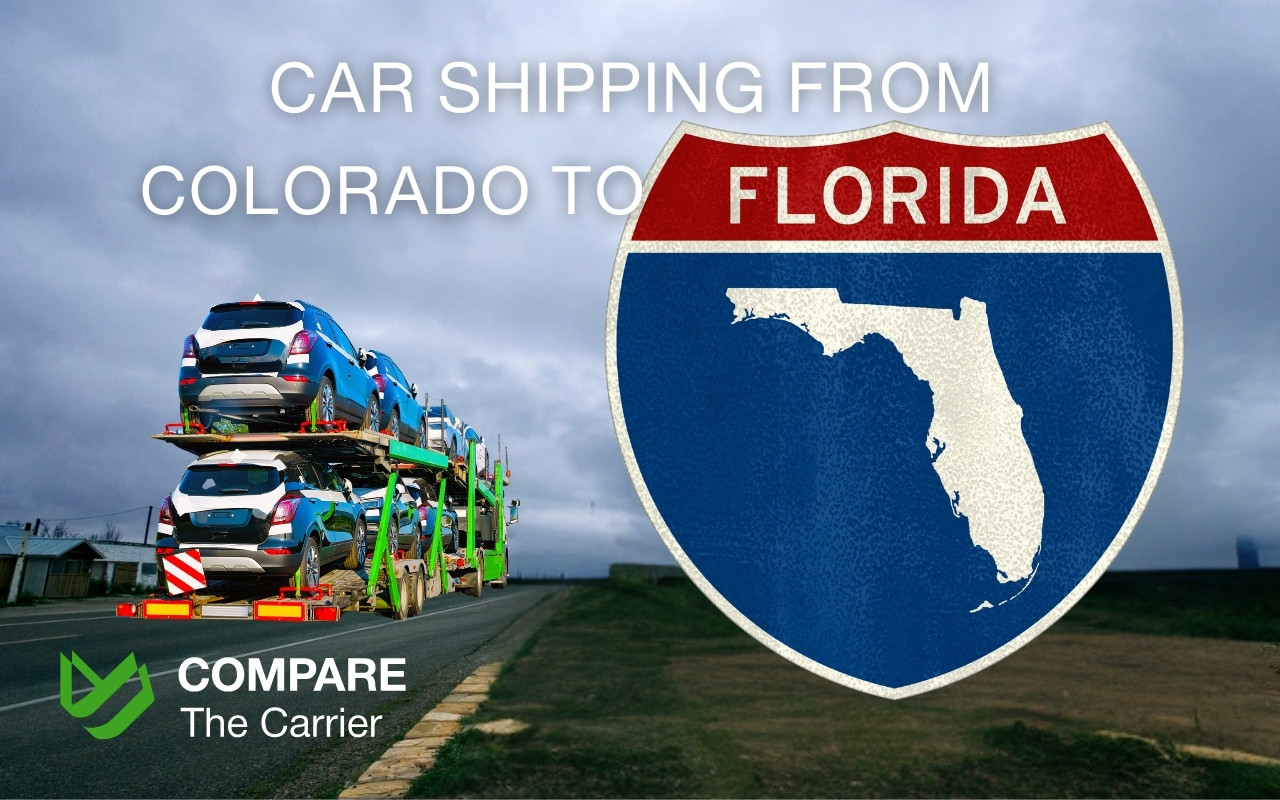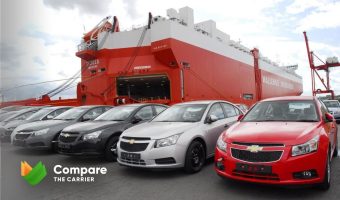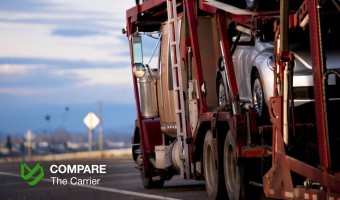Why Ship a Car from Colorado to Florida?
Whether you’re escaping the Rocky Mountain winters, heading to college, relocating for work, or purchasing a vehicle out of state, car shipping from Colorado to Florida is a smart, time-saving solution. With more than 1,900 miles between the two states, driving isn’t always practical — especially when you factor in fuel costs, hotel stays, and wear on your car.
In 2026, auto transport Colorado to Florida is faster, safer, and more reliable than ever, thanks to a wide network of licensed carriers operating nationwide. According to the FMCSA, millions of vehicles are moved across the U.S. each year, with Florida being one of the top destinations for seasonal migrants, retirees, and vehicle buyers.
This guide will walk you through every step of shipping a car from Colorado to Florida, helping you understand the process, costs, timing, and how to avoid common pitfalls — all while showing how platforms like Compare The Carrier make the journey simple and cost-effective.
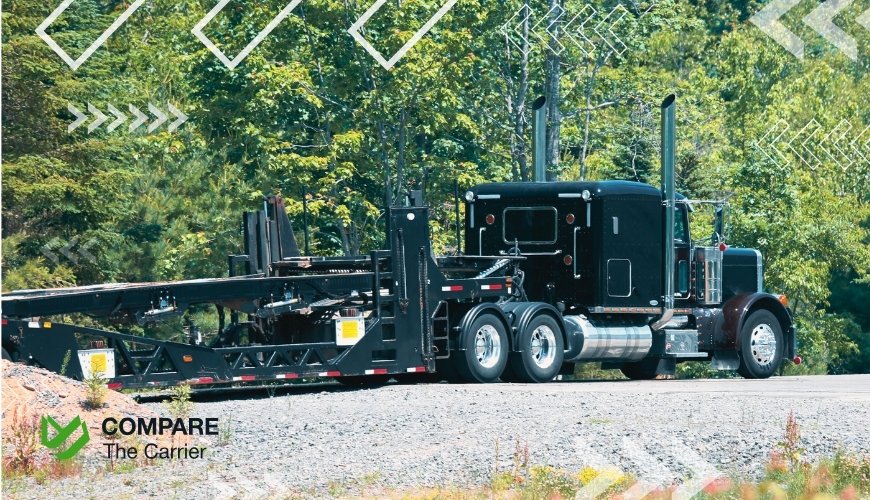
How Auto Transport Works from Colorado to Florida
Shipping a car from Colorado to Florida may sound complicated, but with the right transport partner, the process is surprisingly streamlined. Whether you’re in Denver, Boulder, or Colorado Springs and heading to Miami, Tampa, or Orlando, professional carriers handle this coast to coast vehicle transport route daily.
Step 1: Get a Quote
Start by requesting quotes from licensed carriers or using a vehicle shipping calculator like the one on CompareTheCarrier.com. You’ll be asked to provide:
- Pickup and delivery ZIP codes (from CO to FL)
- Vehicle make, model, and condition
- Preferred transport type (open or enclosed)
- Desired pickup timeframe
This allows you to instantly compare rates from top-rated auto shipping providers—without entering personal details.
Step 2: Book Your Transport
After reviewing offers, choose the trusted auto transporter that fits your budget, schedule, and service expectations. Once you confirm, you’ll receive a booking confirmation and pickup window — usually within 1 to 5 business days.
Step 3: Vehicle Pickup in Colorado
On the pickup day, the carrier will inspect your vehicle and note any pre-existing damage on the Bill of Lading. This document will be used again upon delivery to verify the car’s condition.
Step 4: Transport to Florida
Your vehicle is loaded onto a transport trailer (open or enclosed) and begins the long-distance auto transport journey from Colorado to Florida. Most carriers provide status updates or GPS tracking during transit.
Step 5: Delivery and Final Inspection
Upon arrival in Florida, the driver performs a second inspection and delivers your car either door-to-door or at a designated location. Once you confirm everything’s in order, you’ll sign the final paperwork and complete the process.
With a reliable carrier and proper preparation, Colorado to Florida vehicle transport becomes a smooth, stress-free experience — no matter the distance.
Should You Use a Broker or Go Direct to Carrier?
When planning car shipping from Colorado to Florida, one of the first choices you’ll face is whether to book through a broker or go directly to a carrier. Both options have benefits — but depending on your priorities (cost, convenience, flexibility), one may suit your needs better.
What’s the Difference?
- Carriers are the companies that physically transport your vehicle. They own the trucks and handle the loading, transit, and delivery.
- Brokers are intermediaries. They don’t own transport equipment but instead connect customers with reliable, FMCSA-licensed carriers from a nationwide network.
Pros of Using a Broker
- Access to more options and faster scheduling
- Easier to ship on less common or remote routes (like smaller towns in Colorado or coastal Florida)
- Ability to compare prices and timelines across multiple carriers
- Brokers often have top-rated auto shipping reviews due to volume and service quality
With a platform like Compare The Carrier, you get the benefits of a broker but with full transparency — instant quotes, real reviews, and no hidden markups.
Pros of Going Direct to Carrier
- No brokerage fee
- Clearer communication with the driver
- May be suitable for repeat customers with specific carrier preferences
However, finding and vetting a trusted auto transporter on your own can be time-consuming. Many carriers don’t advertise publicly or only take jobs through broker networks.
Expert tip: If you value convenience, competitive pricing, and vetted options, using a comparison platform like Compare The Carrier offers the best of both worlds — access to reliable services, real-time pricing, and five-star customer reviews.
Cost to Ship a Car from Colorado to Florida
One of the most common questions people ask is: How much does it cost to ship a car from Colorado to Florida? The answer depends on your vehicle, timeline, and preferences — but on average, Colorado to Florida car shipping cost ranges from $950 to $1,400 for standard open car transport.
For enclosed trailers or expedited service, expect rates to rise to $1,500–$2,100+ depending on route, vehicle type, and season.
Sample Price Estimates (2026 Averages)
| Route | Vehicle Type | Open Transport | Enclosed Transport |
| Denver to Orlando | Sedan | $1,050 | $1,600 |
| Colorado Springs to Miami | SUV | $1,200 | $1,850 |
| Fort Collins to Tampa | Truck | $1,350 | $2,000 |
Pricing based on data from licensed FMCSA carriers and market trends.
What’s Included in the Price?
Most quotes include:
- Full insurance coverage
- Door-to-door pickup and delivery
- Fuel and tolls
- Driver communication and tracking (when available)
Some lower-cost options may exclude extras like guaranteed pickup dates or real-time updates. That’s why it’s essential to compare quotes side-by-side to find a reliable auto shipping partner.
Need a real number? Use CompareTheCarrier’s Vehicle Shipping Calculator to get instant quotes for shipping a car from Colorado to Florida—no signup required.
What Affects the Final Colorado to Florida Shipping Price?
When organizing auto transport from Colorado to Florida, understanding what drives pricing can help you budget more accurately — and avoid overpaying. While the average Colorado to Florida car shipping cost gives a general idea, your final rate depends on several key factors.
1. Distance & Route
The further your vehicle has to travel, the more you’ll pay. Routes between major cities like Denver to Miami or Colorado Springs to Orlando are typically less expensive than rural-to-rural shipments. Carriers also consider detours and traffic zones when pricing coast to coast vehicle transport.
2. Transport Type: Open vs Enclosed
- Open transport is the most common and affordable option.
- Enclosed transport offers extra protection from weather, road debris, and theft—but can cost 30–60% more.
Shipping a luxury or classic car? The added investment in enclosed service is worth the peace of mind.
3. Vehicle Type & Condition
Larger vehicles (SUVs, pickup trucks, vans) weigh more and take up more space on the trailer, which increases cost. Non-running or modified vehicles also require special equipment, adding to the final price.
4. Pickup & Delivery Locations
Door-to-door service is convenient, but if you’re in a remote mountain town or gated neighborhood, access may be limited—potentially increasing costs. Terminal-to-terminal shipping can be cheaper but is less flexible.
5. Time of Year
Seasonal demand impacts pricing. During winter months, many snowbirds ship cars to Florida, increasing competition and prices. Booking early can help lock in better rates during peak periods.
6. Delivery Speed
Need your car delivered fast? Expedited shipping is available—but comes at a premium. If your schedule is flexible, choosing a standard delivery window will keep your rate lower.
Pro tip: To find the best value, compare quotes from multiple top-rated auto shipping providers and look for transparent pricing that includes insurance and customer support. CompareTheCarrier makes this easy—with no hidden fees.
Timeline: How Long Does It Take?
Shipping a car from Colorado to Florida typically takes 5 to 8 calendar days, depending on your route, transport type, and time of year. While this is a long-distance auto transport route, professional carriers move vehicles coast to coast daily, making it a predictable and well-managed process.
Typical Transit Times by Route
| Route | Estimated Delivery Time |
| Denver to Miami | 6–8 days |
| Colorado Springs to Tampa | 5–7 days |
| Fort Collins to Orlando | 6–8 days |
What Impacts Transport Time?
- Pickup Window: Most carriers offer a 1–5 business day pickup range after booking. Faster pickup may be available for an additional fee.
- Route Popularity: Busy lanes like Denver to Miami are faster to fill, reducing wait times.
- Seasonal Demand: Winter (snowbird season) and summer (relocations, students) may bring higher volume, slowing down both pickup and delivery.
- Weather & Road Conditions: Icy conditions in Colorado or heavy rain in the Southeast can delay delivery.
- Transport Type: Enclosed carriers are less common, which may delay scheduling if you’re choosing this premium option.
Planning Tip: Book at least 1–2 weeks in advance if possible, especially during peak seasons. This allows you to secure a spot with a trusted auto transporter and potentially save money by avoiding last-minute surcharges.
How to Prepare Your Vehicle for Transport
Proper preparation ensures a smooth and stress-free experience when shipping a car from Colorado to Florida. It also protects your vehicle during loading, transit, and delivery. Here’s how to get your car ready for safe, long-distance auto transport:
1. Clean Your Vehicle Inside and Out
Wash the car so any existing scratches, dings, or paint issues are easy to see. This helps during the pickup inspection and is critical for insurance documentation.
2. Document Current Condition
Take time-stamped photos from all angles, including close-ups of any existing damage. These will serve as proof if any issues arise during Colorado to Florida vehicle transport.
3. Remove Personal Items
Carriers are not responsible for personal belongings left in the vehicle, and many are prohibited from transporting household goods. Remove everything from the cabin and trunk.
4. Keep Fuel Tank at ¼ Full
This is enough for loading and unloading but avoids extra weight during transport. It also complies with most nationwide car shipping safety guidelines.
5. Disable Alarms
Make sure your car alarm is turned off or that the driver has clear instructions on how to disable it in case it goes off during transit.
6. Check for Leaks or Mechanical Issues
Inform the transporter if your car has issues like brake problems, oil leaks, or a dead battery. Non-operational vehicles can be shipped, but they require special handling and may cost more.
7. Remove Accessories and Toll Tags
Take off any removable add-ons like bike racks, spoilers, or antennas. Also remove electronic toll tags to avoid unnecessary charges while the car is in transit.
Vehicle Shipping Prep Checklist:
- Washed and cleaned the vehicle
- Took detailed exterior/interior photos
- Removed all personal items
- Fuel level at ¼ tank
- Alarm disabled
- Mechanical issues disclosed
- Toll tags and external accessories removed
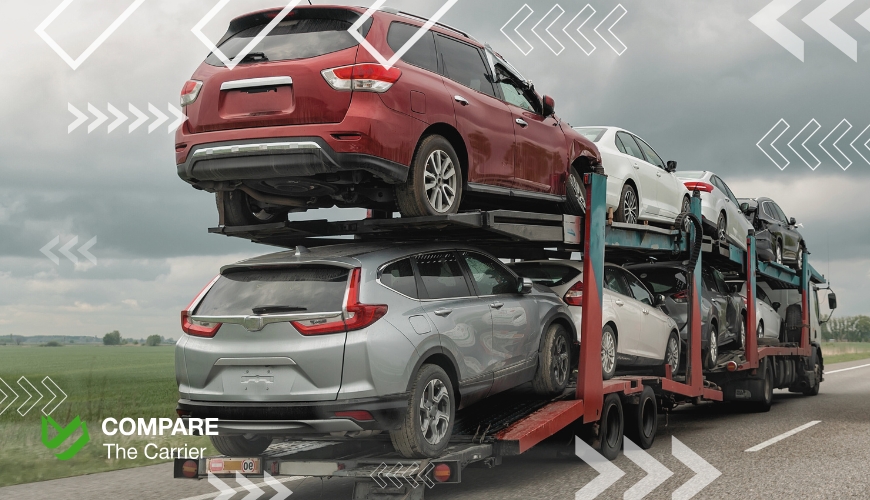
Proper prep ensures a smooth Florida car delivery from Colorado and minimizes any post-transport disputes.
Open vs Enclosed Auto Transport: Which One Is Right?
When arranging car shipping from Colorado to Florida, one of the most important choices you’ll make is whether to use open or enclosed transport. Your decision will affect not only the price, but also how your vehicle is protected during the journey.
Open Auto Transport
This is the most common method used in nationwide car shipping. Your vehicle is transported on an open-air trailer—similar to the ones you see delivering cars to dealerships.
Pros:
- Most affordable option
- Faster availability due to high carrier volume
- Ideal for standard cars, daily drivers, and short deadlines
Cons:
- Exposed to weather, road debris, and dust
- Slightly higher risk of cosmetic damage (though rare)
Best for: Reliable and cost-effective auto transport Colorado to Florida for standard vehicles.
Enclosed Auto Transport
In this method, your vehicle is shipped inside a covered trailer. It’s commonly used for high-end, vintage, or specialty cars where maximum protection is a priority.
Pros:
- Complete protection from the elements
- More attentive handling (fewer cars per load)
- Often includes higher insurance limits
Cons:
- 30–60% more expensive than open transport
- Fewer trucks available, may require longer scheduling time
Best for: Luxury cars, classic vehicles, or new car purchases requiring safe and secure delivery from CO to FL.
Quick Comparison Table
| Feature | Open Transport | Enclosed Transport |
| Price | Lower | Higher |
| Protection Level | Basic | Maximum |
| Availability | High | Limited |
| Best For | Standard vehicles | High-value or exotic |
Still unsure? Use CompareTheCarrier’s free quote tool to compare open and enclosed prices side by side — helping you make an informed decision based on your vehicle and budget.
Delivery in Florida: What to Expect
The final step of your car shipping from Colorado to Florida journey is vehicle delivery. Whether your destination is a beachfront condo in Miami or a suburban driveway in Tampa, understanding how this step works will ensure a smooth handoff.
1. Pre-Delivery Call from the Driver
A few hours before arrival, your carrier will contact you to confirm the exact drop-off location and time. If you’re unavailable, you may assign someone else to receive the vehicle—just notify the driver in advance.
Reminder: Make sure your delivery address is accessible for a large transport truck. If it’s not (e.g. tight residential street, gated community), the driver may suggest a nearby public space for safe unloading.
2. Final Vehicle Inspection
At delivery, the driver will perform a final walkaround inspection, comparing the car’s current condition to the original Bill of Lading. This is your opportunity to check for any transport-related damage.
- Take photos if anything seems new or different
- Note any concerns on the paperwork before signing
This protects your rights in the unlikely event you need to file a claim.
3. Payment (if applicable)
If your carrier uses Cash on Delivery (COD), be prepared to pay the balance via cash, certified check, or another agreed method. Some brokers or carriers allow full prepayment or online options for added convenience.
4. Signing the Bill of Lading
Once everything checks out, you’ll sign the delivery form confirming receipt, and your Florida car delivery from Colorado is complete.
Post-Delivery Checklist:
- Vehicle received at confirmed time/location
- Final inspection completed with the driver
- Payment made (if required)
- Bill of Lading signed
A reliable carrier will make this final step seamless, leaving you free to enjoy your vehicle in Florida — without the stress of a long road trip.
Why Compare The Carrier Is the Smart Choice
When you’re investing in auto transport from Colorado to Florida, choosing the right partner can make all the difference. CompareTheCarrier is built for people who want safe, affordable, and transparent vehicle shipping — without the hassle or hidden costs.

Here’s why it stands out as one of the best car shipping companies for coast-to-coast service:
1. Licensed, Vetted Carriers Only
All transporters on CompareTheCarrier are FMCSA-licensed and insured. That means no shady operators, no fly-by-night carriers — just verified professionals with proven track records and five-star reviews.
2. Instant Price Comparison
No need to call around or submit multiple forms. The platform allows you to instantly compare Colorado to Florida car shipping costs from a wide network of carriers — all in one place.
3. Transparent, No-Obligation Quotes
You’ll never be asked for your phone number or email just to see pricing. Get free quotes instantly using the Vehicle Shipping Calculator—with no commitment required.
4. Real Customer Ratings
CompareTheCarrier features top-rated auto shipping providers based on actual user feedback, so you can choose your carrier based on more than just price. Filter by rating, delivery speed, insurance coverage, and more.
5. Built-in Support
Need help? The platform offers built-in customer support and resources to help you understand every step of the car shipping from CO to FL process.
Bottom line: Whether you’re moving across the country or selling a vehicle out of state, Compare The Carrier helps you find the most reliable, affordable, and safe transport solution — on your terms.
Conclusion: Smooth Shipping, Florida Arrival
From the first quote request to final drop-off, shipping a car from Colorado to Florida doesn’t have to be stressful or unpredictable. With the right preparation, a trusted transport partner, and clear expectations, you can move your vehicle nearly 2,000 miles with confidence.
Whether you’re relocating, sending a car to a student, or escaping the cold for the Florida sun, modern auto transport Colorado to Florida services are built for speed, safety, and peace of mind. Understanding pricing, timelines, and transport types helps you avoid costly mistakes and delays—while platforms like CompareTheCarrier simplify every step.
Ready to get started?
Use our Vehicle Shipping Calculator to compare quotes from top-rated auto shipping carriers—no signup, no hidden fees. Get the best rate, book with confidence, and enjoy a smooth ride to your new destination.
FAQ
How much does it cost to ship a car from Colorado to Florida?
On average, Colorado to Florida car shipping cost ranges from $950 to $1,400 for standard open transport. Prices vary depending on the route, vehicle type, time of year, and transport method. Use our Vehicle Shipping Calculator for instant, no-obligation quotes.
How long does it take to ship a car from Colorado to Florida?
Transit time typically ranges from 5 to 8 days, depending on the pickup/delivery locations, carrier schedule, and road/weather conditions.
Is it better to use a broker or contact a carrier directly?
Using a broker or comparison platform like Compare The Carrier saves time, gives access to more options, and ensures you’re working with licensed, rated carriers. Going direct may offer fewer choices and less flexibility.
What’s the difference between open and enclosed auto transport?
Open transport is more affordable and widely available — ideal for standard vehicles.
Enclosed transport costs more but offers maximum protection for luxury, classic, or high-value cars.
Do I need to be present for pickup and delivery?
It’s recommended. However, you can assign someone to act on your behalf if they have proper documentation and contact with the driver.
Is my car insured during transport?
Yes. All FMCSA-licensed auto transporters must carry insurance. Be sure to confirm coverage limits and request a certificate if needed.
Can I leave personal items in the car?
Most carriers do not allow personal items due to insurance and weight restrictions. Remove all valuables before shipping.
How far in advance should I book my shipment?
Book at least 7–10 days in advance to secure the best rates and availability—especially during high-demand seasons like winter and summer.
How do I track my vehicle during shipment?
Many trusted auto transporters offer tracking updates by phone, text, or email. Ask your carrier or broker about real-time tracking availability.
Can I ship a non-running vehicle from Colorado to Florida?
Yes, but it must be disclosed in advance. Shipping inoperable vehicles may require a winch and will incur additional costs
Is door-to-door delivery included?
Yes, most quotes include door-to-door auto transport, as long as the addresses are accessible by large transport trucks. If not, the driver will coordinate a nearby meeting point.
Can I track my car while it’s in transit?
Many top-rated auto shipping companies offer GPS tracking or driver updates via text or email. Ask your carrier or broker if real-time tracking is available.
What forms of payment are accepted?
Many carriers accept Cash on Delivery (COD), certified checks, or online payments through the broker. Payment terms will be outlined during booking.
What should I do if my car is damaged during shipping?
Inspect the car at delivery and note any new damage on the Bill of Lading. Take photos and contact your broker or carrier immediately to file an insurance claim.
Are there seasonal price fluctuations?
Yes. Prices can spike during snowbird season, holidays, or high-traffic months. Booking early helps lock in lower rates.
Why should I use Compare The Carrier?
Compare The Carrier gives you access to licensed, top-rated auto shipping companies with real customer reviews. It simplifies booking, offers transparent pricing, and lets you compare multiple quotes instantly—no email or phone number required.
